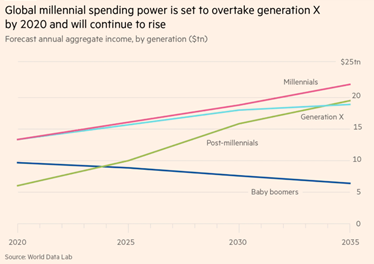Chinese young rich kids, the perfect target for International Brands

China’s young rich are riding the tech boom, but most of rich kids come from their family.
The Chinese young rich kids are the perfect target for brands. They play an important role in China’s booming luxury market, mostly because their parents have money to spare and they are a generation of people who grew up with the internet.
Cost-Effective Agency
KPI and Results focused. We are the most visible Marketing Agency for China. Not because of huge spending but because of our SMART Strategies. Let us help you with: E-Commerce, Search Engine Optimization, Advertising, Weibo, WeChat, WeChat Store & PR.
The majority of them are only children from wealthy families who were raised on home cooking and private tutors, which is why many of them are so stylishly dressed. As this group matures into adults,

it will be interesting to see how they spend their time and whether or not that spending changes as their financial status does.
People born between 1980-2000 make up 18% of China’s population with an estimated net worth exceeding $1 trillion USD (Citigroup).
Young Chinese consumers are the perfect consumers for seoagencychina.com
This makes a huge opportunity for international high-end brands.The group is one of the most powerful and active on social media, often driving trends in luxury goods and high-end fashion. They are also known to be heavy spenders, with a penchant for acquiring aspirational products. This post will outline how you can successfully market your brand to these elusive consumers, as well as provide insights into their spending habits.
Generational Dominance
Boomers are still taking the lion’s share of wealth in Western economies. In fact, they’re hogging a whopping 80% of economic output for themselves!
That leaves just 20% to be shared among other age groups while also fighting over what scraps remain after these biased generations have taken their cut first.
However, the global economy is an intensely complex system. The wealth of your country can depend on the demographic makeup and size, as well as economic policies. Countries with higher proportions of younger people may have a more promising financial future because they are able to invest in education now that will pay off later when their population’s older members retire or leave working life behind them for good; aging populations need fewer resources than those who work full-time jobs at every stage from schooling through retirement age.


These days, it might be tempting to think that young people are the only ones worth paying attention to. However, Boomers still have a lot of economic power. They are still responsible for driving markets around the world so do not forget about them!
China’s youth are the driving force for China’s new economic era. With a population size of over 1 billion and an average age below 40 years old (roughly the same as our Millennials)
there is five times more Chinese youth than American youth in existence. But that is not all to this story; their upbringing has been drastically different from those before them too–China is currently experiencing its first modern economic era with little knowledge about what went on beforehand due to poverty or political turmoil while they live comfortably today. As such these generations have grown up naturally embracing consumerism without any qualms which contrasts sharply against the generation preceding them who grew up poor and were raised under much harsher conditions during politically tumultuous periods.
China has a history of sacrificing now for the future. The older generation endured hardships so that their children would have more enjoyable lives today. This is reflected by China’s financial timeline, where they went through periods of economic hardship to create stability and prosperity for themselves later down the line.
Nonetheless, we observe a disproportionate distribution of wealth and spending. 79% of the spending on extravagance labor and products in China was finished by individuals under 40 as indicated by McKinsey and Bain, who also calculate that China will represent generally 50% of all worldwide extravagance costs by 2025.
It is hard to see an international point of view when you are only looking at your home country. Different countries have different current and future population sizes, as well as their own economic growth rates which can affect the generational force in their society. Countries also vary on how they manage money – for example, if a nation invests more into pensions or spends less on healthcare it will have a higher GDP but fewer people who are generally healthy enough to work without needing benefits from social programs like welfare. This shift could potentially cause societal tension between old and young generations because while one generation might be making decisions that hurt themselves now another may then need help later due to lost income opportunities thanks to those policies
A big difference between parents and children
We observe the generation gap in the West, but it is nothing compared to China. In China, it is believed that we can observe significant differences more or less every 5years.
Western parents were not struggling as oriental ones.
It is important to consider how adults and young people differ from one another when it comes to spending patterns and lifestyles. Younger generations have different spending habits than their parents do – they are more open to online shopping, one example of how technology has changed our consumption patterns as consumers.
Different but apples do not fall far from the tree
You may have never thought about it, but your parents are the most influential people in the world! They have got a say as to what you learn, your values and how much money you will make.
Boomers of the 1970s in America rebelled against traditional values and established themselves as Generation Me. As Millennials have taken over, such behavior has become commonplace. American Millennials are a generation that has been raised under an umbrella of relativism and the idea that “everyone’s opinion is just as valid.” This attitude, combined with being constantly connected to social media networks where everyone can have their voices heard equally, shapes many aspects of this new generation. Millennials were raised in a culture defined by positivist thinking — meaning they believe anything is possible simply because we set our minds to it.
China is a nation that has undergone drastic changes in the past few decades. One of these monumental shifts was Mao’s economic policies, which led to famine and the lack of many people born during this era. This left China with an older generation who grew up living simple lives without abundant necessities or luxuries like access to education. Nowadays, however, younger generations are turning their attention more towards indulging themselves through foodie culture and luxury goods rather than focusing on universal needs such as food or shelter due to not having seen much deprivation early on in life at all – they have never known anything but abundance!
Where is the easy money in China?
The younger generations seem to have an advantage when it comes to market power because of the leniency from their parents regarding money. In China, there is a sense that family members should help one another out financially and will often do so without hesitation or even much discussion about how they are doing this for each other.
In China, young people have more freedom over finances than older individuals due mostly in part to the fact that families tend not only to be larger but also very close-knit with little financial strife between them as opposed to Western culture where many families can sometimes struggle just making ends meet let alone supporting someone else’s children financially while needing assistance themselves.
Boomers are still very important in the United States because of their unwillingness to part with money. New research shows that boomers who reside in the U.S., unlike those from China and other parts of Asia, refuse to sell off assets or liquidate retirement savings for fear it would cripple them financially later on down the line when emergencies arise and medical expenses accumulate; this makes these people a powerful commodity–a force so influential as can even cause stocks prices to rise if there is enough buying interest present among an older demographic.
Global inequality is not a new issue, but it has come to the forefront of public consciousness in recent years. A large part of this trend can be attributed to one country’s rise as an economic powerhouse: China. Alongside rapid industrialization and urbanization, there have also been drastic changes in social norms which were previously unchallenged or unquestioned — such as gender roles and marriage customs that are now being challenged by millennials who grew up with greater access to information than any generation before them; meanwhile, their parents’ generation struggles with modernity without understanding all its implications for family life.
Read more






